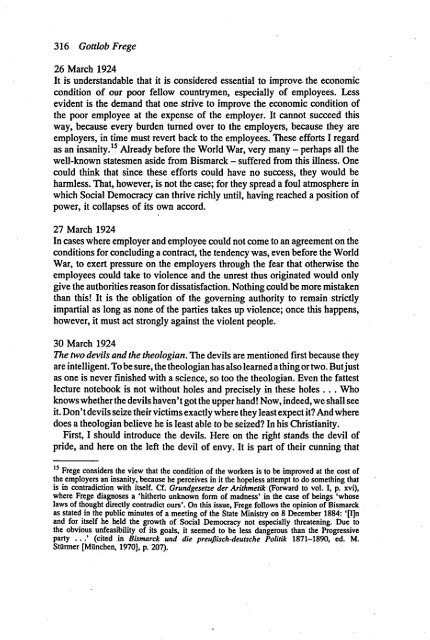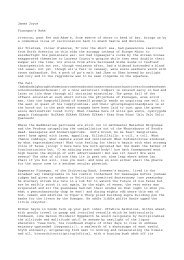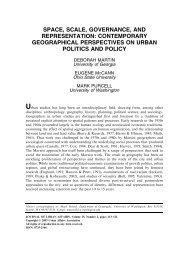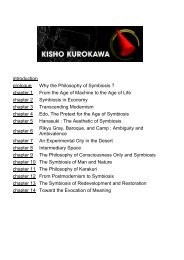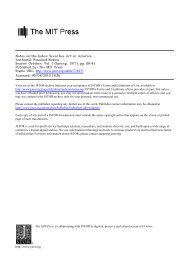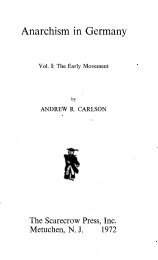Diary: Written by professor Dr Gottlob Frege in the ... - AAAARG.ORG
Diary: Written by professor Dr Gottlob Frege in the ... - AAAARG.ORG
Diary: Written by professor Dr Gottlob Frege in the ... - AAAARG.ORG
Create successful ePaper yourself
Turn your PDF publications into a flip-book with our unique Google optimized e-Paper software.
316 <strong>Gottlob</strong> <strong>Frege</strong><br />
26 March 1924<br />
It is understandable that it is considered essential to improve <strong>the</strong> economic<br />
condition of our poor fellow countrymen, especially of employees. Less<br />
evident is <strong>the</strong> demand that one strive to improve <strong>the</strong> economic condition of<br />
<strong>the</strong> poor employee at <strong>the</strong> expense of <strong>the</strong> employer. It cannot succeed this<br />
way, because every burden turned over to <strong>the</strong> employers, because <strong>the</strong>y are<br />
employers, <strong>in</strong> time must revert back to <strong>the</strong> employees. These efforts I regard<br />
as an <strong>in</strong>sanity. 15 Already before <strong>the</strong> World War, very many - perhaps all <strong>the</strong><br />
well-known statesmen aside from Bismarck - suffered from this illness. One<br />
could th<strong>in</strong>k that s<strong>in</strong>ce <strong>the</strong>se efforts could have no success, <strong>the</strong>y would be<br />
harmless. That, however, is not <strong>the</strong> case; for <strong>the</strong>y spread a foul atmosphere <strong>in</strong><br />
which Social Democracy can thrive richly until, hav<strong>in</strong>g reached a position of<br />
power, it collapses of its own accord.<br />
27 March 1924<br />
In cases where employer and employee could not come to an agreement on <strong>the</strong><br />
conditions for conclud<strong>in</strong>g a contract, <strong>the</strong> tendency was, even before <strong>the</strong> World<br />
War, to exert pressure on <strong>the</strong> employers through <strong>the</strong> fear that o<strong>the</strong>rwise <strong>the</strong><br />
employees could take to violence and <strong>the</strong> unrest thus orig<strong>in</strong>ated would only<br />
give <strong>the</strong> authorities reason for dissatisfaction. Noth<strong>in</strong>g could be more mistaken<br />
than this! It is <strong>the</strong> obligation of <strong>the</strong> govern<strong>in</strong>g authority to rema<strong>in</strong> strictly<br />
impartial as long as none of <strong>the</strong> parties takes up violence; once this happens,<br />
however, it must act strongly aga<strong>in</strong>st <strong>the</strong> violent people.<br />
30 March 1924<br />
The two devils and <strong>the</strong> <strong>the</strong>ologian. The devils are mentioned first because <strong>the</strong>y<br />
are <strong>in</strong>telligent. To be sure, <strong>the</strong> <strong>the</strong>ologian has also learned a th<strong>in</strong>g or two. But just<br />
as one is never f<strong>in</strong>ished with a science, so too <strong>the</strong> <strong>the</strong>ologian. Even <strong>the</strong> fattest<br />
lecture notebook is not without holes and precisely <strong>in</strong> <strong>the</strong>se holes . .. Who<br />
knows whe<strong>the</strong>r <strong>the</strong> devils haven't got <strong>the</strong> upper hand! Now, <strong>in</strong>deed, we shall see<br />
it. Don't devils seize <strong>the</strong>ir victims exactly where <strong>the</strong>y least expect it? And where<br />
does a <strong>the</strong>ologian believe he is least able to be seized? In his Christianity.<br />
First, I should <strong>in</strong>troduce <strong>the</strong> devils. Here on <strong>the</strong> right stands <strong>the</strong> devil of<br />
pride, and here on <strong>the</strong> left <strong>the</strong> devil of envy. It is part of <strong>the</strong>ir cunn<strong>in</strong>g that<br />
15 <strong>Frege</strong> considers <strong>the</strong> view that <strong>the</strong> condition of <strong>the</strong> workers is to be improved at <strong>the</strong> cost of<br />
<strong>the</strong> employers an <strong>in</strong>sanity, because he perceives <strong>in</strong> it <strong>the</strong> hopeless attempt to do someth<strong>in</strong>g that<br />
is <strong>in</strong> contradiction with itself. Cf. Grundgesetze der Arithmetik (Forward to vol. I, p. xvi),<br />
where <strong>Frege</strong> diagnoses a 'hi<strong>the</strong>rto unknown form of madness' <strong>in</strong> <strong>the</strong> case of be<strong>in</strong>gs 'whose<br />
laws of thought directly contradict ours'. On this issue, <strong>Frege</strong> follows <strong>the</strong> op<strong>in</strong>ion of Bismarck<br />
as stated <strong>in</strong> <strong>the</strong> public m<strong>in</strong>utes of a meet<strong>in</strong>g of <strong>the</strong> State M<strong>in</strong>istry on 8 December 1884: '[I]n<br />
and for itself he held <strong>the</strong> growth of Social Democracy not especially threaten<strong>in</strong>g. Due to<br />
<strong>the</strong> obvious unfeasibility of its goals, it seemed to be less dangerous than <strong>the</strong> Progressive<br />
party . . .' (cited <strong>in</strong> Bismarck und die preußisch-deutsche Politik 1871-1890, ed. M.<br />
Stürmer [München, 1970], p. 207).


